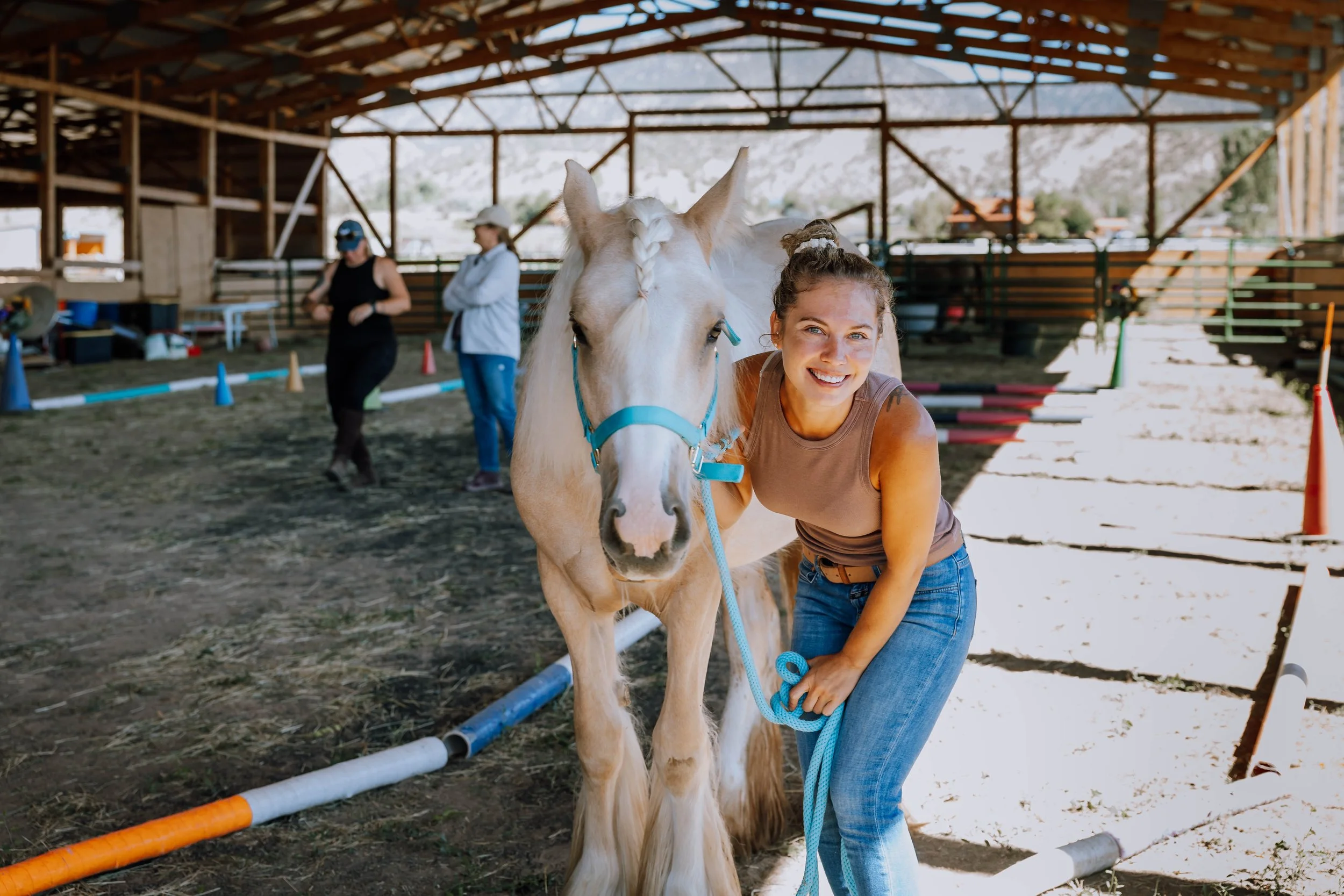9 Ways Equine Assisted Learning Can Benefit Your Confidence, Relationships & Career
Horses are unique teachers who noticeably adjust their body language to your thoughts and actions. They reflect what you’re feeling: clearly and without judgment. Since each horse acts as a mirror for your feelings, as you become more aware of the horse’s body language, you’re building greater self-awareness. In this same way, horses also help us learn skills such as effective communication, boundary setting, and problem-solving skills, as they allow us to test different skill strategies with instantaneous feedback in a judgement-free environment.
Learning these skills improves our relationships at work, at home and in our social circles. It also makes us more confident in our decision making and how we conduct ourselves.
Let’s break down some of the benefits of EAL that can help us meet our goals in all areas of our lives:
Enhanced Self-Awareness:
Horses are sensitive to human emotions and body language, providing participants with instant feedback that can reveal positive and negative behavioral patterns and promote self-reflection on participants’ feelings and actions and how those feelings & actions affect others. This leads to greater self-awareness of the participants emotions and emotive reactions to situations, helping them better understand and manage their emotions and reactions outside of the arena.
Related: 4 Ways Horses Can Help You Better Understand Yourself
Improved Communication Skills:
EAL encourages clear verbal and non-verbal communication, as participants learn to interpret the horse's behavior and respond accordingly through a variety of activities. Participants can then use these skills to confidently communicate with friends, family and coworkers, clearly asking for their needs to be met, setting boundaries and being honest about their feelings. In turn, EAL also encourages participants to listen to and understand others, both verbally and through their body language, similarly to how horses communicate with their body language.
Related: 5 Tips to Ask for Help with Confidence
Leadership Skills:
Learning to direct a horse's behavior teaches participants which methods of communication and persuasion do and no not result in the desired outcome. The participant can then use these same skills and techniques to lead others at work and in their social circles. While you won’t be pulling on your coworkers’ reins to get them to listen to you, developing your leadership style in a judgement- and consequence-free environment will give you the confidence you need to become a leader in other areas of your life.
Improved Emotional Regulation:
Working with horses can help individuals learn to identify, manage and regulate their emotions, first by identifying them as the horse mirrors them, and then by seeing the horse’s reaction as they manage their emotions and change their reactions in certain situations. This allows the participant to practice noticing and managing their emotions in a healthy way.
Increased Empathy:
As participants learn to understand and connect with the horse's emotional state, they begin to build empathy for the horse. This exercise allows them to practice connecting with others’ emotional states and displaying empathy for what they’re going through. This is especially important for those that find connecting with and/or working with others challenging, but it can also help couples and families become better intune with each other’s emotions as they work with horses together.
Related: Tools for Connection
Increased Confidence and Self-Esteem:
Successfully understanding and interacting with horses can boost participants’ confidence and self-esteem. Not only will participants feel more confident as they gain skills that relate to everyday life, but overcoming obstacles in the area provides a sense of accomplishment and mastery that boosts participants' overall mental state and mood. Participants often feel more creative and excited to brainstorm solutions to problems after sessions, which will continue as they begin to tackle more obstacles outside the arena.
Problem-Solving and Decision-Making Skills:
EAL provides participants with the opportunity to problem-solve and practice making decisions in real-time in an environment with very low stakes and with a teacher that never judges. The more you practice these skills the more confidently you will begin making decisions outside of the arena. Participants also learn to not be ashamed of failing to solve a problem on the first attempt and instead become comfortable testing multiple solutions and not being discouraged when their first solution doesn’t work. This builds resilience and open-mindedness that helps participants tackle problems outside of the arena with confidence.
Safe and Judgement-Free Experiential Learning Environment:
EAL offers a unique learning environment where participants can explore new behaviors and receive immediate feedback without the pressure of traditional learning settings. There are no grades or peers to judge you if you make a mistake, and working in a hands-on environment provides better, longer lasting results than theoretical knowledge alone, as participants are able to learn by trial and error and practice skills in a safe space before employing them in their lives.
Related: Behind the Scenes of The Recovery Resources EAL Program - A Q&A with Founder & Lead Instructor Janelle Duhon
Improved Interpersonal Skills:
EAL can help individuals, families and groups develop stronger interpersonal skills, such as teamwork, leadership, and conflict resolution, through interactions with the horses and other participants. These skills benefit those who have difficulty understanding or working with others, help families heal broken relationships and begin relating to one another again, help prevent bullying in our schools and community groups, and help team members better work together to solve problems on the job.
Are you interested in creating positive change in your life, family or workplace? We offer a variety of EAL programs for individuals, families, corporate groups and community groups to teach the skills needed to build stronger, healthier relationships and succeed at your personal and career goals.
Written by Liz Haas, Recovery Resources Digital Marketing & Outreach Specialist

